anti-Adiponectin (human), mAb (HADI 773)
| Code | Size | Price |
|---|
| AG-20A-0001-C050 | 50 ug | £173.00 |
Quantity:
| AG-20A-0001-C100 | 100 ug | £227.00 |
Quantity:
Prices exclude any Taxes / VAT
Overview
Host Type: Mouse
Antibody Isotype: IgG1κ
Antibody Clonality: Monoclonal
Antibody Clone: HADI 773
Regulatory Status: RUO
Target Species: Human
Applications:
- Enzyme-Linked Immunosorbent Assay (ELISA)
- Immunohistochemistry (IHC)
- Western Blot (WB)
Shipping:
Blue Ice
Storage:
-20°C
Images
Documents
Further Information
Alternate Names/Synonyms:
ACRP30; AdipoQ; apM1; GBP28; Adipocyte Complement Related Protein of 30kDa
Concentration:
1mg/ml
EClass:
32160000
Form (Short):
liquid
Formulation:
Liquid. 0.2µm-filtered solution in PBS, pH 7.4. Contains no preservatives.
Handling Advice:
After opening, prepare aliquots and store at -20°C.Avoid freeze/thaw cycles.
Immunogen:
Recombinant human adiponectin.
Long Description:
Monoclonal Antibody. Recognizes human adiponectin. Detects a band of ~30kDa by Western blot. Cross-reactivity with other species not tested. Isotype: Mouse IgG1kappa. Clone: HADI 773. Applications: ELISA, IHC, WB. Liquid. 0.2µm-filtered solution in PBS, pH 7.4. Contains no preservatives. ACRP30 was identified as a novel adipocyte-specific synthesized and secreted protein with structural resemblance to complement factor C1q. Like adipsin, ACRP30 secretion is induced ~10-fold during adipocyte differentiation. Plasma levels are reduced in obese humans, and low levels are associated with insulin-resistance. Treatment of db/db mice with TZD increased ACRP30 levels.
NCBI, Uniprot Number:
Q15848
Package Type:
Plastic Vial
Product Description:
ACRP30 was identified as a novel adipocyte-specific synthesized and secreted protein with structural resemblance to complement factor C1q. Like adipsin, ACRP30 secretion is induced ~10-fold during adipocyte differentiation. Plasma levels are reduced in obese humans, and low levels are associated with insulin-resistance. Treatment of db/db mice with TZD increased ACRP30 levels.
Specificity:
Recognizes human adiponectin. Detects a band of ~30kDa by Western blot. Cross-reactivity with other species not tested.
Transportation:
Non-hazardous
UNSPSC Category:
Primary Antibodies
UNSPSC Number:
12352203
Use & Stability:
Stable for at least 1 year after receipt when stored at -20°C.
References
Plasma resistin concentrations measured by enzyme-linked immunosorbent assay using a newly developed monoclonal antibody are elevated in individuals with type 2 diabetes mellitus: B.S. Youn, et al.; J. Clin. Endocrinol. Metab. 89, 150 (2004) | Genetic association study of adiponectin polymorphisms with risk of Type 2 diabetes mellitus in Korean population: Y.Y. Lee, et al.; Diabet. Med. 22, 569 (2005) | Adiponectin expression in human fetal tissues during mid- and late gestation: S. Corbetta, et al,; J. Clin. Endocrinol. Metab. 90, 2397(2005) | Renin receptor expression in human adipose tissue: V. Achard, et al.; Am. J. Physiol. Regul. Integr. Comp. Physiol. 292, R274 (2007) | Adiponectin immunohistochemical expression in colorectal cancer and its correlation with histological grade and tumour microvessel density: V. Barresi, et al.; Pathology 41, 533 (2009) | The expression of adiponectin receptors Adipo-R1 and Adipo-R2 is associated with an intestinal histotype and longer survival in gastric carcinoma: V. Barresi, et al.; J. Clin. Pathol. 62, 705 (2009) | Effect of monomeric adiponectin on cardiac function and perfusion in anesthetized pig: E. Grossini, et al.; J. Endocrinol. 222, 137 (2014) | Acute vitamin D3 supplementation in severe obesity: Evaluation of multimeric adiponectin: S. Mai, et al.; Nutrients 9, 459 (2017)



